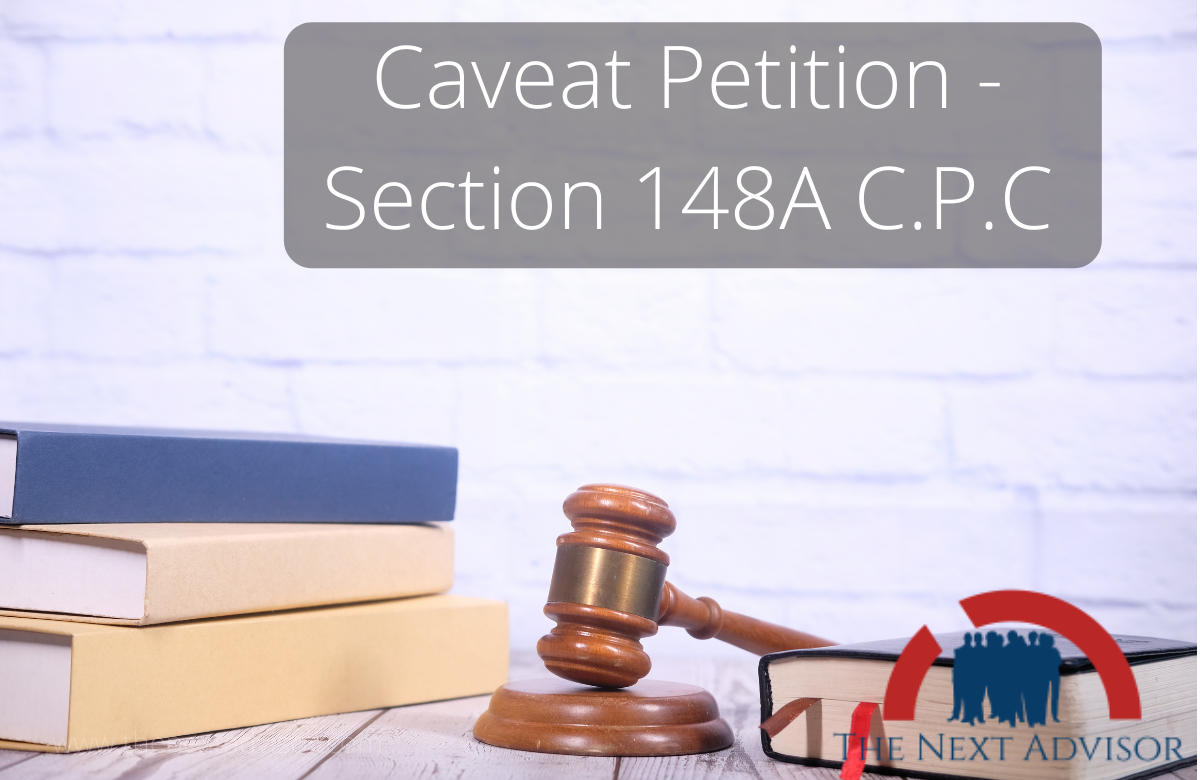Legal Practitioners must have ever heard that the caveat petition Section 148A CPC has been filed. And the law students must have also heard about the Caveat Petition. Here you will get the answer to all these questions what is a wait petition after all?
So this question must have come to the mind of the student that what is a tablet petition and not only in the mind of the student there are some new ones who are legal practitioners. The question must have come to their mind that what is the Caveat petition. Who can file a caveat petition and how is it filed?
So first of all let me tell you that caveat means be aware! It is a Latin word and caveat is information given by one party to another. Notice in which it is said that the court should not give any relief to the other party without giving notice to the applicant or taking any action which is in the favor of the other party. It is a defense that is taken by one party.
If we look at section 148 of CPC, we will get to know about what is Caveat Petition and we can get a deep understanding of it through this section. By this section, we also get to know how cabinet petition is filed? Because Caveat Petition comes in court only under section 148.
The person who files the Caveat Petition is called a Caveator. Caveat petition is a kind of defense that a party raises when they feel that there is a case going on in the court that is not related to them, but in this case, some action can be taken against them and a decision can be given which can affect them.
The validity of the caveat petition is 90 days. That is when a petition is filed against you in the court, that is, when a case is filed against you in the court, it comes in Vectric on the same day and it remains in effect for 90 days.
If the case is filed in court by the opposite party within 90 days Then you will be given a notice from the court regarding that. And once the 90 days period is over, you will have to file the caveat again. You will also have to put the name of the opposite party in the caveat petition.
When whoever suspects can file a case against you in the case or take any action against you in court. So now the question is, who can file the Caveat petition? So a person who fears that in his case the opposite party is about to file an application. And once Caveat Petition is filed, it is the court’s duty to send a notice to Capital of the case against him. So now let us also know what should be usually included in the tablet petition?

let a person be aware
Wha is Caveat Petition- Section 148A
The caveat in Latin term means “let a person be aware” and in law, it may be understood as a notice given not to act in a certain manner without informing the person who gave such a notice.
Caveat Petition-Section 148A:- Under the Civil Procedure, the provision of caveat dealt with in Section 148A.
Caveator:- The person who files a caveat is called the caveator.
Caveatee:- The person who has instituted a suitor is likely to do so is called Caveatee.
The objective of Caveat Petition – Section 148A C.P.C
The main object of the caveat is to ensure that the Court does not pass ex parte orders and that the interests of the caveator are protected.
Case Law in which court defined the word Caveat Petition – Section 148A C.P.C
Even though CPC does not define caveat in the case of Nirmal Chand Vs. Girindra Narayan, the court defined a caveat as a warning given by an individual to the Court that no order or judgment shall be passed without giving notice or without hearing the caveator.
When to lodge a Caveat Petition Section 148A C.P.C
According to Section 148A, when people apprehend that some case against them is filed or is about to be filed in any court of law in any manner, they have a right to lodge a caveat. The Caveat may be lodged in the form of a petition under the following circumstances:
Thus, firstly it is always about an application in a suit of the proceeding, and secondly, that suit or proceeding can be in the present which is already insisted or it can be in the future where a suit is not instituted yet but the same is expected. In all such situations the right to lodge a caveat arises.
Who may lodge a Caveat Petition Section 148A C.P.C
Section 148A further provides that a caveat may be filed by any person, whether a party to the suit or not, as long as the person filing the caveat has the right to appear before the court in regard to the suit in question. To conclude, this clause is substantive in nature and a caveat may be filed by any person claiming a right to appear before the court. Thus caveats can be filed by a third party as well, if they in any manner are connected to the suit in question.
“No Caveat can be lodge by a total stranger to the suit.”
Where can a caveat petition section 148A be lodged?
As and when the caveator anticipates some legal proceedings to be filed against him in the near future, he can file a petition for a caveat in any Civil Court of original jurisdiction, Appellate Court, High Court, Supreme Court. Caveat petition section 148A can file in Civil Courts including Courts of small causes, Tribunals, Forums, and Commissions.
Can Caveat be filed against Criminal Proceedings?
However, in Deepak Khosla Vs. Union of India & Ors, the Court held that Section 148A of the Code applies to civil proceedings only and caveat cannot be made against petitions made under the Criminal Procedure Code or petition made under Article 226 of the Constitution of India.
Limitation of time to file caveat petition section 148A
As provided by the Section in clause 5, the caveat stays in force for a period of 90 days. If within these 90 days an application is filed then the court, as well as the applicant, has to give notice to the caveator. However, if no caveat is filed within these 90 days, then no one has the duty to inform the caveator, i.e. if the application is filed after the expiration of such period the caveat stands null and void.
If the caveator still wants to be informed then a fresh caveat needs to be lodged for the next 90 days.



























